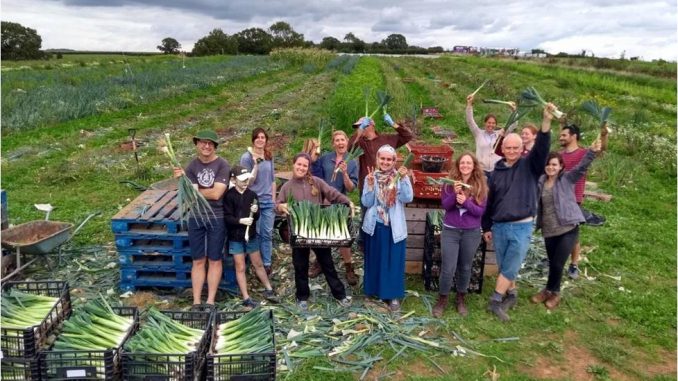
A new e-book published by ARC2020 documents one community’s inspiring response to the COVID-19 crisis.
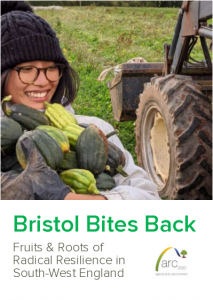
Every crisis has a silver lining. Last summer, as we reeled from the Covid crisis, Ursula Billington, a sustainability activist in Bristol (UK), reached out to ARC2020. Were we interested in stories about community-based food and farming projects in her corner of South-West England?
Ursula’s stories of the sustainability movement couldn’t have come at a better time.
As we faced into a second wave of Covid and another round of restrictions in the autumn, struggling to picture the new normal, Ursula regaled us with tales of agroecological transition in and around Bristol.
A balm to our beleaguered spirits, these stories are tangible, practical proof that ecosystem-based approaches to food, farming and sustainability do indeed bear fruit for their patient protagonists – in some cases after decades of going against the grain of a productivist mindset.
In the spirit of ARC2020’s Letters From The Farm series, Ursula also widens the lens beyond the farm gate. Her focus on the people behind the projects and the wider community ties into broader issues of environmental and social justice, striking parallels with our Nos Campagnes en Résilience project in France.
What really comes across in these stories is the web of community that ties them all together, as the same names crop up like old friends. It’s a reminder of the importance of sticking together in the wake of another crisis – that of Brexit. Europe is, after all, more than the institutions of the EU – it’s we the people.
Here in the EU, the Common Agricultural Policy (CAP) seems ever less conducive to fairer, more nature-friendly farming. We watch with interest as the UK forges its own path with a new Agriculture Bill. Because as strong as the grassroots movement may be, government support is crucial to help enable Bristol’s fledgling agroecological transition to take flight.
For the time being, however, British government policies have been little help, as allotments close and access to land slips away. We can learn from the communities in and around Bristol who are defying top-down challenges by coming together at local level. Radical approaches to resilience are more important than ever, and bearing fruits for the grassroots.
Download the new e-book “Bristol Bites Back: Fruits & Roots of Radical Resilience in South-West England”
Fruits & Roots of Radical Resilience in South-West England: Download our new e-book!
A decade ago I signed up for Shift Bristol’s Practical Sustainability Course. Much like Bristol, this “one year adventure in sustainability” appeared to be unique. The varied curriculum covered permaculture, soil and ecology, green energy, organic horticulture, woodland management, natural building and more.
Most exciting was the chance to experience sustainable living as an everyday reality, by visiting working projects across England and Wales.
The course cranked open my imagination and showed me an alternative is possible, and there for the taking.
It also reflected the ethos of Bristol at large. I began to notice this alternative thriving wherever I turned: Bristol is alive with green activity and adventurous, creative changemakers. The city-wide orchard project supporting garden and wasteland fruit tree growing; the permaculture gardens at the heart of Glastonbury, the world’s largest music festival; the food growing project Incredible Edible Bristol, providing fresh produce in city centre parks, shopping centre planters and makeshift railway station gardens.
“We’re probably a bit rebellious, a little anarchistic when it comes to being told….” – Andy Wear, Fernhill Farm
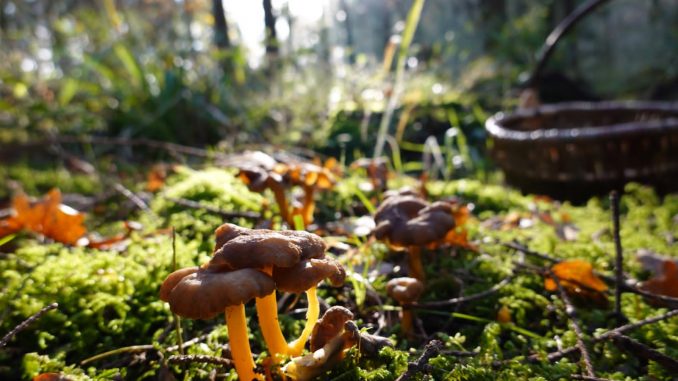
Mycelium network
The course began to join the dots of the city for me. It weaved organically in and out of life as I knew it, throwing up new shoots and budding in unexpected places. Its mycelium network of green action weaves through all aspects of city life, the invisible strands binding each thread of change into a greater whole. Collaboration, community and creativity join forces to engender a fearlessness that inspires pioneering projects and approaches.
Bristol was hot on the heels of London in establishing the UK’s first city farms in the 1970s, joined today by countless thriving community gardens and allotments.
Livestock have been integrated into the urban landscape; with small-scale innovative operations such as mushroom growing and bee keeping they demonstrate the infinite potential of the metropolitan environment.
Resourceful Bristolians put unworked land to good use, and protect precious local spaces like the highly fertile Blue Finger on the city’s fringe.
Regenerative agriculturalists Fernhill Farm sum up the Bristol spirit when they suggest: “We’re probably a bit rebellious, a little anarchistic when it comes to being told….”
Mushroom grower Patrick Mallery reflects it in his attitude towards local growing: “I want to give people the power to take control of their food. It’s one of the few things we can do that’s quite revolutionary.”
It resonates with the words of ‘gangsta gardener’ Ron Finley, adopted by Edible Bristol: “Growing food in the city is the most radical art, and you get strawberries.” The project’s punchy message sets its intent in veg beds strewn across the city: “Resistance is fertile.”
“I want to give people the power to take control of their food. It’s one of the few things we can do that’s quite revolutionary.” – Patrick Mallery, Upcycled Mushrooms
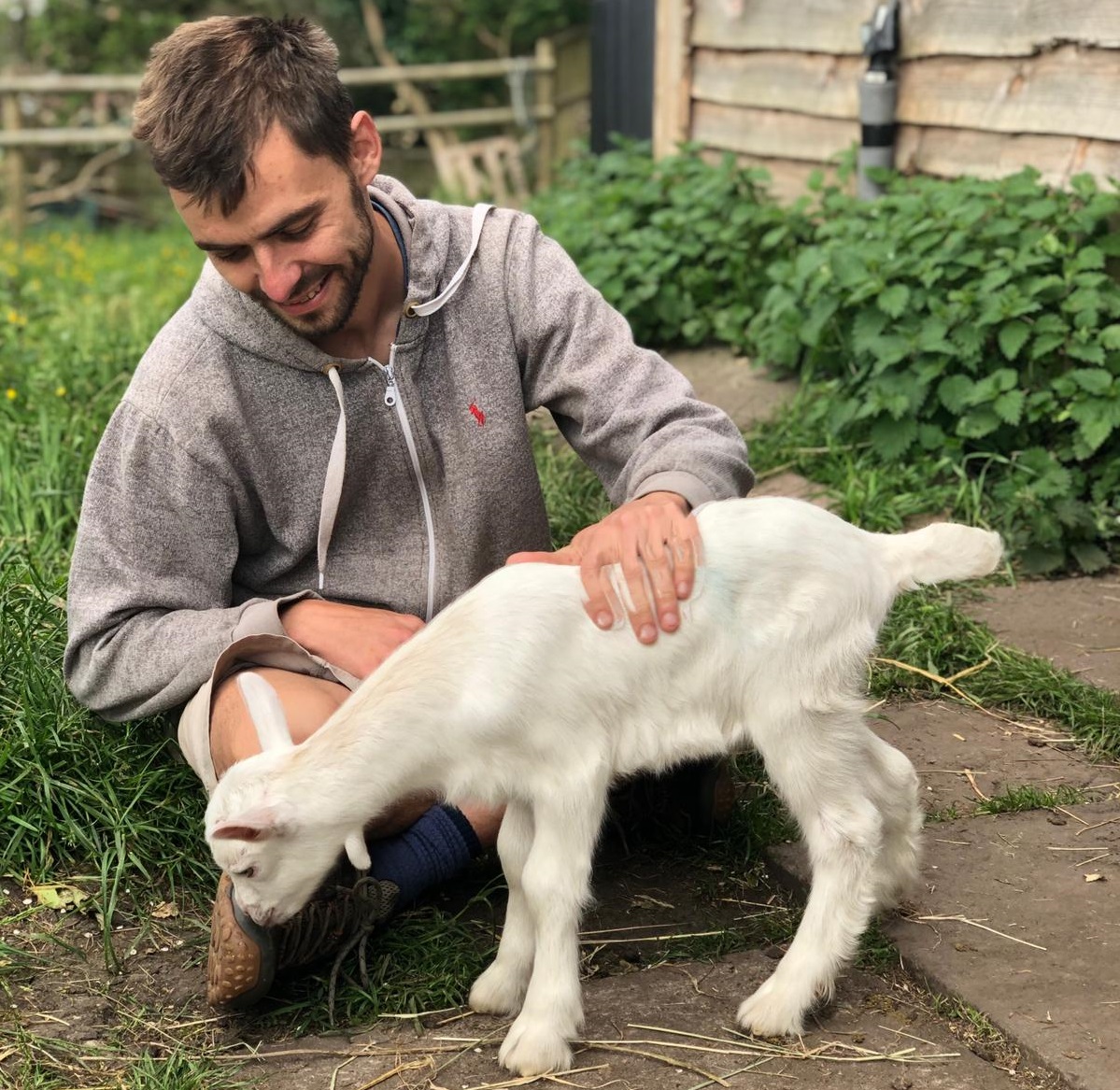
Antidote to gloom and doom
The energy is infectious; it inspired me to get involved and play my part. But after jobs focusing, amongst other things, on the humanitarian impact of climate change, food justice, and the global soil fertility crisis, I was in need of an injection of positivity: I circled back to the inspiration so present on my doorstep.
My local story was in such refreshingly high contrast to the common ‘doom and gloom’ narrative of planetary destruction: the organic growers greening pockets of the city, goats roaming the streets, chemical-free wool shorn only a few miles down the road and dye plants grown just streets away. I was in the centre of a city but in my mind’s eye I saw a wash of green, buzzing wildlife, a hive of activity working towards a more nature-integrated urban landscape. The recent surge of appreciation for nature and local production is accompanied by increased action to tackle the city’s inequality, to make these spaces and facilities available for all.
Exploring each project, I felt renewed optimism for the future, and a reinvigorated desire to get my hands dirty. Hopefully readers near and far will feel the same.
Each project is keen to spread the word, to share skills and resources. Most of all, there’s an ethos of sustainability through diversity, of plants, people, projects and approaches.
In sowing a seed – whether the fruit be wildflowers, salads, fibres, forest schools or roundhouses – each individual contributes to a beautiful patchwork of solutions to enable diverse communities to flourish.
I’m sure Bristolians are not the only ones – there must be scores of creative changemakers out there, pioneering new ways with sustainability in their communities. Sharing the visions, practical methods and solutions will turn ripples of positive action into waves, ensuring a more nature-friendly future for people everywhere.
More from the UK
Rewilding | What would happen if Britain’s farms were abandoned and left to nature?
‘Too good to be true’ – The UK Co-op Helping New Entrants Get Access to Land
UK | RSA Report finds ‘Our Future in the Land’ should be Agroecological
What would really happen to GHG Emissions if England and Wales went Organic?




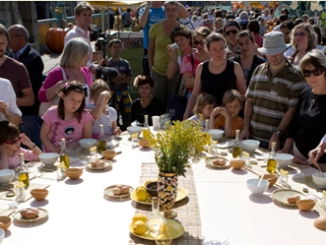

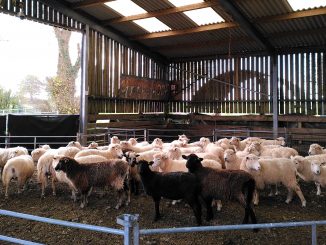
3 Trackbacks / Pingbacks
Comments are closed.